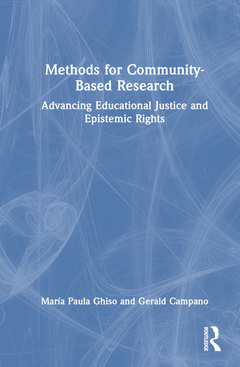Methods for Community-Based Research Advancing Educational Justice and Epistemic Rights
Auteurs : Ghiso María Paula, Campano Gerald

Methods for Community-Based Research describes how Community-Based Research (CBR) is particularly suited to understand and take action on issues of educational justice.
The book shifts assumptions about who is considered a researcher, drawing attention to issues of power and the ethics of collaborations, and foregrounding how those who have often been positioned as the objects of educational interventions can?and have the rights to?play an active role in creating educational arrangements more conducive to their own flourishing.
The authors draw on a decade-long partnership across the boundaries of race, language, immigration status, and institutional affiliation to provide examples that illustrate the complexities and possibilities of this work. They distill principles, practices, and ongoing inquiries for researchers to consider across all aspects of the research process.
The book supports researchers in creating the conditions for collaborative inquiry into issues of educational (in)justice that are salient to community partners. It will be of interest to advanced undergraduate, graduate students and scholars in education, and other disciplines that utilize a CBR method such as healthcare research and anthropology, as well as scholars interested in qualitative methods and issues of social justice in research.
1. Community-Based Research in the Service of Educational Transformation 2. What is Community-Based Research in Education? Belonging and Common Cause 3. What Does it Mean to Partner? New Images of the Engaged Scholar 4. What Are the Ethics of CBRE? Methodology as a Practice of Love 5. How Do You Develop and Support Collaboration? Consensus Building in CBRE 6. How Does a CBRE Lens Inform Research Design? Collaborative Data Collection and Analysis 7. What Does It Mean to Go Public with Research in CBRE? Scholarship as Intellectual Activism 8. What Is the Impact of CBRE? Individual and Collective Self-Determination 9. Community Perspectives on CBRE
María Paula Ghiso is Professor of Literacy Education in the Department of Curriculum and Teaching at Teachers College, Columbia University in New York City, USA.
Gerald Campano is Professor of Literacy Studies at the University of Pennsylvania Graduate School of Education in Philadelphia, PA, USA.
Date de parution : 04-2024
15.6x23.4 cm
Date de parution : 04-2024
15.6x23.4 cm
